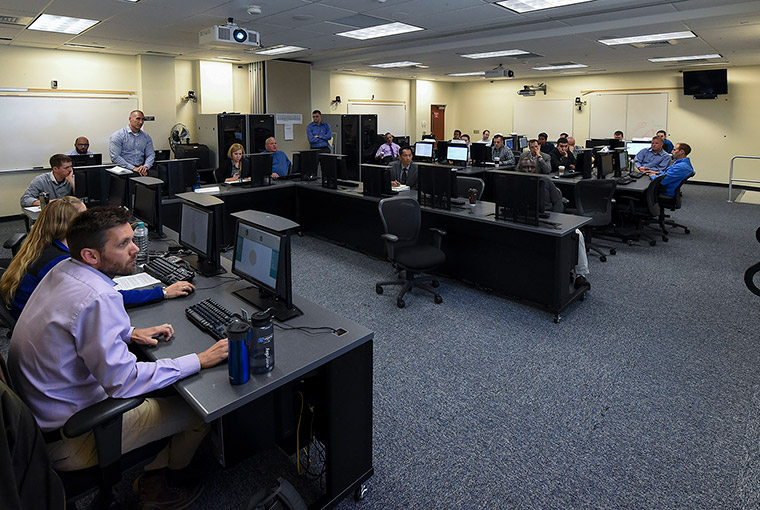NWC's Joint Military Operations course holds Capstone event

NEWPORT, R.I. - The Joint Military Operations (JMO) department at U.S. Naval War College (NWC), Newport, Rhode Island, held its Capstone educational event designed to expose students in the courses to maritime warfare problems and how to creatively approach them.
For the “War Game at Sea” exercise, 277 students in the school’s College of Naval Command and Staff (CNCS) and Naval Staff College (NSC) were divided into 10 seminar groups with each group working to solve the same complex scenario to establish sea control in a region of the South China Sea.
“We want the students to take away the experience of decision making, planning and dealing with a combat situation and responding to it given their circumstances,” Chair of JMO Capt. Edmund Hernandez said. “All while keeping the intent of their commander in mind in order to achieve their objective.”
Jamie Gannon, associate professor in JMO and course coordinator said the exercise pulls concepts from throughout the trimester.
“This is where the students really apply everything they’ve learned throughout the course,” he said. “This is about bringing together naval tactics, operational art, naval warfare theory, planning, international operational law, and even a little bit on irregular warfare. We apply everything they’ve learned from naval warfighting and the Navy Planning Process.”
The wide-ranging event covers six game days and includes two additional days for the faculty to analyze and adjudicate the students’ efforts.
“This exercise has really given us the opportunity to broaden our aperture and see the bigger organizational picture,” a student in the course Army Maj. Jon Rembetsy said. “Making decisions in the normal chain of command involves one set of variables. In this simulation, we are working with peers, so we have to come to a consensus on what the problems are, what the solutions are, and how to execute those solutions. This is very valuable training for me.”
Students were asked to develop a creative operational approach that addresses the requirements levied on the Joint Force. In the scenario, the strategic environment makes resources scarce. Political impatience is another factor the players are asked to consider.
U. S. military dominance is never assured and the limitations require critical and creative thought to balance the competing objectives of the Joint Force hopefully resulting in a unified effort.
“The best part is to see how the students evolve, learn grow and respond to the challenges we give them,” Hernandez added. “We may not know if we are successful until a year from now or five or 10 years when they are actually fighting in the fleet. The ultimate measure and test of effectiveness is if they’ve taken the skills here and synthesize them to be able to make good plans and execute them in the real world. We are making an investment now in these future leaders to fight future wars.”
NWC’s CNCS course is for intermediate level U.S. officers and civilians while NSC students are predominately foreign officers. The two classes take much of the same curriculum including this Capstone exercise.
NWC is a one-year resident program that graduates about 600 resident students and about 1,000 distance learning students each year. Its missions include educating and developing leaders, helping define the future of the Navy, supporting combat readiness, and strengthening maritime partnerships. Students earn Joint Professional Military Education (JPME) credit and either a diploma or a master’s degree in National Security and Strategic Studies or Defense and Strategic Studies. Established in 1884, U.S. Naval War College is the oldest institution of its kind in the world. More than 50,000 students have graduated since its first class of nine students in 1885 and about 300 of today’s active duty admirals, generals and senior executive service leaders are alumni.
